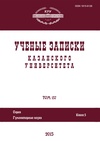Словообразовательные особенности языка Казанского Евангелия XIV века: субстантивная деривация
Word-Formation Features of the Kazan Gospel of the 14th Century: Nominal Derivation
Author(s): Nataliya Gennadyevna NikolaevaSubject(s): Phonetics / Phonology, Morphology, Lexis, Historical Linguistics, Russian Literature, Eastern Slavic Languages, Philology
Published by: Казанский (Приволжский) федеральный университет
Keywords: Kazan Gospel; Old Russian language; historical word formation; nominal word formation; variation; word formation synonymy; genre; style; text;
Summary/Abstract: The nominal word formation in the text of the Kazan Gospel of the 14th century relating to the lectionaries of the Mstislav type has been analyzed. The study aims to clarify the available data on this issue, to add to the description of the lexical and semantic features of the manuscript, and to identify it’s the specificity of word-formation patterns. The research is focused on the forms of nominal word formation as the main text-forming units. The analysis has been performed using a combination of synchronic description of the intra-lexical content and comparison with other texts of a similar genre and stylistic affiliation and chronology. As a result of the study, the representativeness of word-formative types of the noun has been established. The conclusions have been made about the genre and stylistic features of the text on the basis of the word-formative pattern representing it, in general, as well as the specifics in the sphere of word formation of this particular manuscript. The major findings can be summarized as follows: firstly, the derivational field of the manuscript determines the genre and stylistic nature of the Old Slavic gospel text; secondly, it underwent the common for that period Russification, resulting in the quantitative representation of the derivational types and their phonomorphemical implementation; thirdly, the word-formative paradigm contributes to the restriction of word-formative meanings and fixing them for a certain word-formative type, which is important for the semantic relations in the language as a whole. The functioning of the forms of nominal word-formation in the text proves the primacy of its content over the formal side.
Journal: Ученые записки Казанского университета. Серия Гуманитарные науки
- Issue Year: 160/2018
- Issue No: 5
- Page Range: 1050-1058
- Page Count: 9
- Language: Russian

